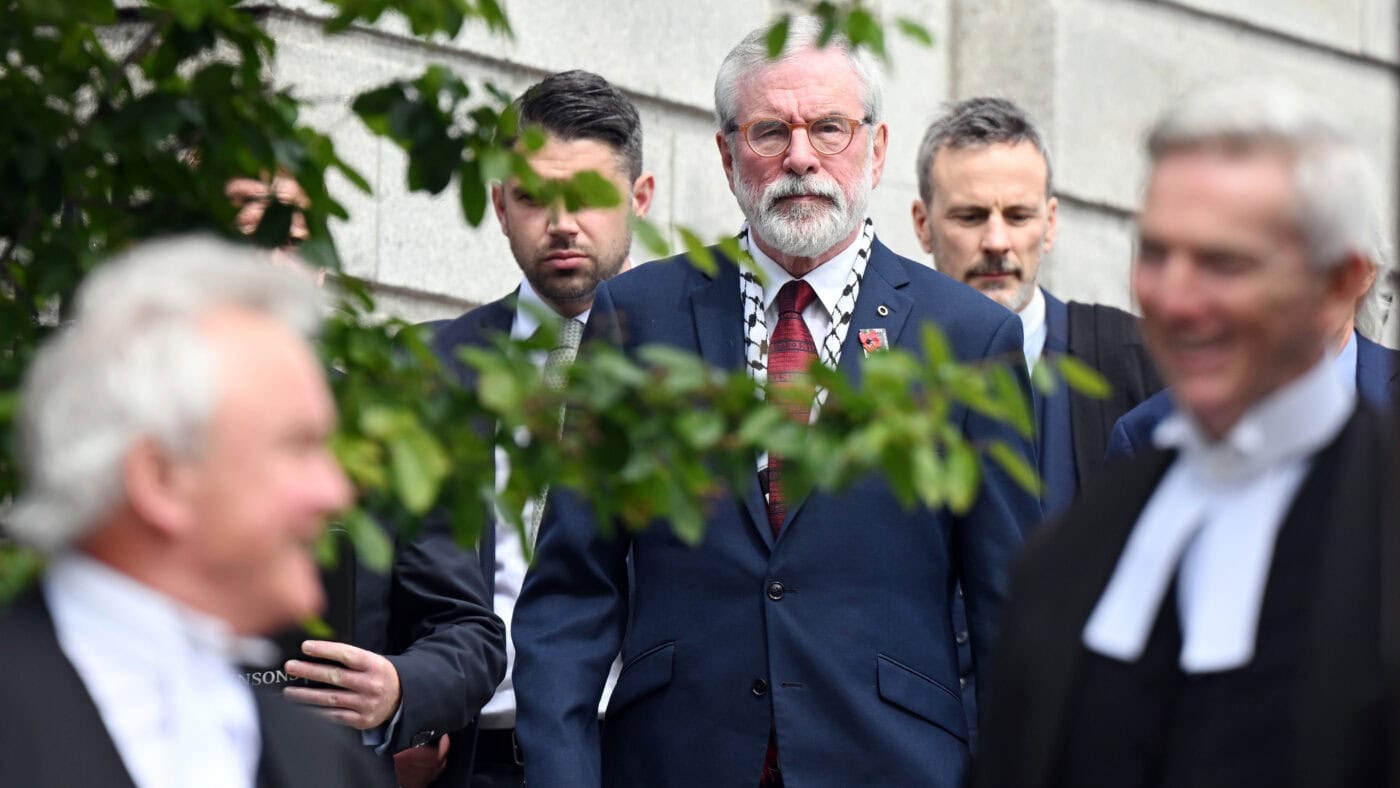After a Dublin court awarded Gerry Adams €100,000 (£84,500) in damages, the Belfast Telegraph published a curious column by its crime correspondent, Allison Morris. She argued that a new generation viewed the former Sinn Fein president through a ‘modern lens’ rather than dwelling on the ‘horrors of the past’. Younger members of the jury were, ‘not swayed by the evoking of past Troubles tragedies’ at the trial, and, as a result, the media must in future, ‘reflect the views… of the next generation of reader, listener and viewer’.
You could deride this analysis, but it is at least revealing. Setting aside the specifics of the Adams case, in Northern Ireland, Sinn Fein and other Irish separatists have worked tirelessly to shove the IRA’s campaign of murder down a kind of memory hole. In this endeavour, they have been surprisingly successful. Many younger people in both parts of Ireland are now persuaded that the chief aggressor in Ulster’s Troubles was the British state. They believe that, when the security forces were not perpetrating violence directly, they orchestrated it through their agents in terrorist groups like demented puppeteers.
The ‘peace process’, as it was conceived by the government, required Sinn Fein’s involvement, which was secured and maintained by issuing pardons and ‘letters of comfort’ to IRA murderers. In effect, the justice system had to overlook Irish separatist crimes to keep new political institutions in place. We are now in an age when ‘truth’ is often portrayed as a matter of individual perception. Why wouldn’t a generation that did not experience the Troubles directly expect their elders to forget what happened and demand that the media back up their distorted view of history?
We are, after all, perilously close to that outcome already.
Last week, Adams, who at best led an Irish republican movement that many would argue is responsible for thousands of deaths, gloated outside the courtroom that he had ‘put manners on the BBC’. In the conspiratorial world of hardline republicanism, the national broadcaster, which has devoted countless hours of programming to nationalists’ campaign for an all-Ireland republic, ‘upholds the ethos of the British state in Ireland’.
In 2016, the BBC Northern Ireland flagship current affairs programme, Spotlight, aired allegations that Adams sanctioned the murder in 2006 of Denis Donaldson, a senior IRA member and Sinn Fein employee who had admitted being an MI5 agent. Adams denies any involvement. The jury decided this amounted to defamation, rejecting the idea that his reputation was too appalling to damage, and awarded him an obscene sum in compensation.
It is important to stress that Donaldson’s double life was exposed because the IRA was investigated for operating a spy ring at Stormont, using Sinn Fein offices and staff. The ‘Stormontgate’ scandal of 2002 suggested that the terrorist group and its political wing worked together as part of one indivisible movement. Northern Ireland’s police service raided the party’s offices, and Donaldson, a senior official, was later arrested. It was when the case against him was dropped, three years later, to protect his identity as a spy, that Adams called a press conference to reveal that the former terrorist had confessed he was an agent.
Sinn Fein’s most infamous figurehead maintains that he was never in the IRA. When the government met the paramilitary group secretly in the early 1970s, as the prelude to a brief ceasefire, Adams was one of the two delegates appointed by the IRA. In ‘Gerry Adams: An Unauthorised Life’, the journalist Malachi O’Doherty quoted a confidential memo from the British side’s envoy, former army captain Philip Woodfield, which described Adams as ‘a prominent leader’ of an ‘indiscriminate campaign of bombing and shooting.’
Two of the most authoritative histories of the Provisional IRA, by Ed Moloney and Richard English, claimed that Adams was part of the organisation’s ruling Army Council from the late 1970s, while multiple sources point to his senior leadership roles in its ‘Belfast Brigade’. In 1978, he was arrested the day after the IRA fire-bombed the Le Mon House Hotel near Belfast, incinerating 12 people at a dinner dance, including members of the Irish Collie Club. Adams was charged with IRA membership a week later, but was freed when a judge ruled there was insufficient evidence.
The Netflix drama, ‘Say Nothing’, recently told the story of two former IRA members, Dolours Price and Brendan Hughes, who insisted that Adams personally ordered the abduction and murder of Jean McConville, a mother of ten, accused of passing information to the security forces. Adams denies any involvement in the abduction of Jean McConville.
But you do not have to accept all the details of painstaking historical research or the well-placed sources’ accounts of Adams’ life, to feel nauseated by the Dublin jury’s decision to award him damages. At the very least, he explained the IRA’s perspective to the world for decades, justifying its violence and laundering its reputation, with the blackest, most ruthless cynicism. If the verdict had been made by the judge, rather than twelve members of the public, there would at least have been a detailed legal explanation for the judgment. The UK abolished jury trials for libel more than ten years ago.
As it is, this €100,000 payout is an outrageous insult to the innocent victims of the IRA. Meanwhile, it emboldens Sinn Feiners and other hardline separatists, some of whom are already delivering not-so-veiled threats to journalists who may be considering delving into the party’s past. The goal is that, eventually, it will become almost impossible to give an accurate account of the Provisional movement’s role in the Troubles. That blood-stained tale, you see, may not ‘reflect the views’ of the next generation of readers, listeners or viewers on the island of Ireland.
Click here to subscribe to our daily briefing – the best pieces from CapX and across the web.
CapX depends on the generosity of its readers. If you value what we do, please consider making a donation.


